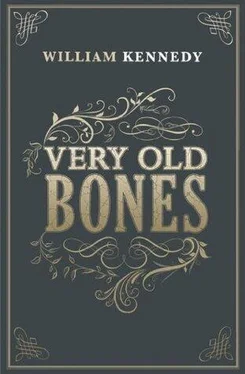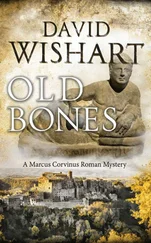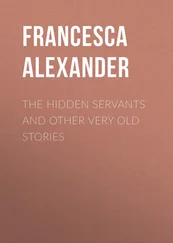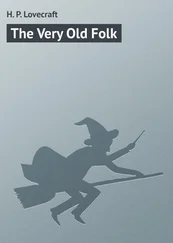Only with the death of his mother was Peter now able to challenge the light on Colonie Street. It was fitting that she died in early December, for on these days the exterior world matched the pale gray and sunless interior of the house, night coming on almost as a relief from the daytime sky that hovered over the city like a shroud. Peter remembered his own mood always being depressingly bleak during this time of year, days getting shorter, and darker; and not until January’s false spring would the season of desperation begin to fade with the fading of this miasmic light.
He had not known he would buy the chandeliers until he showed me the money on the train; but he knew then that he could buy them and would, for at long last it was time. He knew also that Sarah would fight him on the matter and that Molly and Chick would join him in overriding her objections. But Mama’s grip on the past had been released finally, she having been as dark-willed as the biddy of story who refused an indoor, running-water toilet saying, I wouldn’t have one of them filthy things in the house, and equally adamantly Kathryn refused electric current as being diabolical; and so the children rarely brought visitors home, so shamed were they that their house, its clutter, its mood, even the odor of its air, had slowly become a museum of everybody else’s rejected past.
With my help, Peter carried the Claire chandelier up the front stoop, opened the door with his key, and entered with the call, “Peter is here.” He and I then carried the boxes into the front parlor as the electrician hauled his gear and wire into the house. Chairs and side tables, including Peter’s leather armchair, footstool, pipe stand, and ash tray, had been moved from in front of the parlor’s bay window, the designated area for coffin and corpse, though no corpse had occupied it for thirty-nine years, not since Peter’s father waked here after stepping backward into the path of a slow-moving locomotive in 1895. Peter cut the twine on one box, put his hand inside, then turned to see his sisters, Sarah and Molly, in the doorway watching him.
“What are you doing?” Sarah asked. “What is that box? Who is this boy, and that man there?”
“The man is our electrician. The boy is my landlady’s son, Orson. Orson Purcell. Say hello to Sarah and Molly, Orson. My sisters.”
I saw two women who seemed at first to be twins, so alike was their dress: long-sleeved, high-necked white blouses, full dark skirts well below the knee, hair done in the same style: upswept into a soft crown, pinned in a bun at the back of the neck. But in glancing from one to the other I saw nothing else in their faces that matched: Sarah, with dark hair going gray, small round spectacles, hazel eyes very close together, long nose, pursed mouth, cheeks on the verge of sinking: here was plainness; and Molly, the same hazel eyes, but a longer, more finely pointed nose, finer symmetry and greater breadth to the eyes and mouth, and a fullness to the lips, and her hair still a pure, burnished yellow: here was beauty.
“How do you do,” I said. “I’m pleased to meet you.”
“And we you,” said Molly
“He speaks well,” said Sarah.
“His mother is very bright,” Peter said, “and he and I do our share of talking, don’t we, Orson?”
I nodded and smiled and looked at my father, who seemed so utterly unlike his sisters. There he stood, hand inside the chandelier box, still in his slouch hat and all-weather raincoat, his hair halfway down his neck and as unkempt as his handlebar mustache, his black corduroy shirt and twisted brown tie hanging like the end of a noose, the totality of his clothing, seen in the context of this house, a uniform of rebellion.
Everything I remember from this room on the day the light of the world arrived, had a fragility to it, the Queen Anne table, the china tea set, the French antique sofa and love seat, the dragonfly lamps, the Louis Quinze chairs that seemed incapable of supporting adults. And the room was dustless: wood and vases and figurines and even the white marble bust of a beautiful woman on her five-foot pedestal (Peter had given it to Julia on her eighteenth birthday) scrubbed and shining, all tables oiled, all brass polished, all floors waxed, all things gleaming, even in that rationed fragment of gray December light that was allowed entry past the mauve drapes.
“What is in that box?” Sarah asked.
Peter, squatting, his right hand still in the box’s mysterious interior, suddenly lifted the chandelier into freedom (like a magician, I could say), and with his other hand pulled away the tissue paper that surrounded it, then held it aloft. Presto!
“ Fiat lux! ” Peter said.
“What?”
“Light,” said Peter. “Electric light. To replace that monstrosity.” And he gestured toward the pendant gasolier on the parlor ceiling. “That ugly thing’s been here since before Cleveland was President. Light. New light in this house, Sarah.”
“We don’t want it,” said Sarah.
“How well I know that , dear sister. But we shall have light on the corpse of our mother, light unlike any that ever found its way into this arcane cave of gloom.”
“I love it,” said Molly. “It’s so pretty. Look at it, Sarah, look how it shines.”
“Wait till you see it lit,” Peter said.
“If you put it up I’ll have it taken down as soon as you leave,” Sarah said.
“And if you do that,” said Peter, “I shall come home with a club and break every piece of your beloved pottery glassware, and bric-a-brac. Believe me, Sarah, I am serious.”
“You’re a villain,” she said, and she walked into the hallway and up the front stairs.
“Don’t mind,” Molly said. “I’ll take care of her.” And she walked to Peter and kissed his cheek, studied the chandelier which with his right arm Peter still held half aloft. She touched the shining chrome rims around the bottom of the globes, touched the ball-shaped switches under each globe.
“Isn’t it beautiful,” said Molly.
“It’s all of that,” Peter said. “It will give us pleasure. It will banish our shame at being the leftover household. It will put a sheen on your beautiful hair, my sweet sister, and it will satisfy my craving to be done with gloom and come home to respectable radiance.”
I looked at the light around me for the first time in my life. Never had I considered it a topic worth conflict, or enthusiasm. Light was; and that was that. What more could you ask of it? It was bright or it was dim. You saw in it or you didn’t see. If you didn’t then it was dark. But now came revelation: that there were gradations, brightness to be measured not only in volume but in value. More brightness was better. Amazing.
The doorbell sounded, a pull-bell ding-dong. Molly answered the bell and accepted from the delivery man a small basket of white and purple flowers, brought them to the back parlor, and set them atop the player piano (which had replaced the Chickering upright that Julia Phelan played until she died; and music in this house died with her until Peter exchanged the Chickering for the player and bought piano rolls of the same songs Julia had played since they were children together).
“I know they’re from Mame Bayly,” Molly said. “She’s always the first flowers at every wake, always a day early. By the time we get to the cemetery they’ll be brown and wilted.”
The electrician had decided that the emergency installation of the chandeliers could be done only by running wire along the ceiling and through the outer wall to the nearest power pole and Peter said fine, run it anyplace you like, just get the power in here; and took off his coat and hat at last, and with his own tool chest began undoing the gasolier and capping the pipe that carried its gas. Since the death of his father Peter had been the master mechanic of the family, even in absentia, consulted via telephone on every plumbing and structural crisis, consulted when the back porch railing fell off, consulted on retarring the roof and on installing storm windows when the price of gas escalated in 1921.
Читать дальше












